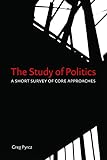Study of politics : a short survey of core approaches / Greg Pyrcz.
Material type: TextPublication details: Toronto : University of Toronto Press, 2011.Description: 213 pages ; 23 cmISBN:
TextPublication details: Toronto : University of Toronto Press, 2011.Description: 213 pages ; 23 cmISBN: - 9781442601437
- 320.01 PYR.S
| Item type | Current library | Collection | Call number | Status | Date due | Barcode |
|---|---|---|---|---|---|---|
 Books
Books
|
Reference | 320.01 PYR.S (Browse shelf(Opens below)) | Available | SLSN-B-8769 |
Browsing Symbiosis Law School, Noida shelves, Collection: Reference Close shelf browser (Hides shelf browser)

|

|

|

|

|

|

|
||
| 320.01 LOC.S Second treatise of government and a letter concerning toleration | 320.01 MOR.N Nontaxation and representation : | 320.01 MUK.I Introduction to Political Theory | 320.01 PYR.S Study of politics : | 320.01 ROU.D Discourse on the origin of inequality | 320.01 WOL.P Introduction to political philosophy / | 320.01092 HAA.D David Hume |
Includes bibliographical references and index.
Machine generated contents note: One.Introduction to the Study of Politics
The Origins of the Discipline
The Language of Politics: Power, Influence, Legitimacy, and Authority
Folk Theories of Political Agency
Sources of Political Conduct
Five Modes of Inquiry
The Normative in Political Studies
A Taxonomy of Core Approaches
Conclusion
Further Reading
Two.Three Traditional Approaches
Regime Theory
Analytical Political Studies
Political Philosophy
Three.The Science of Political Studies
Institutionalism
Group Theory
Power Theory
Structural Functionalism
Systems Theory
Rational Choice Theory
Behaviouralism
Sociobiology
Four.Interpretive Political Studies
Textual Analysis
(Political) Cultural Studies
Linguistic Structuralism
Interpretive Psychoanalysis
Five.Critical Political Studies
Contents note continued: Structuralist Marxism
Critical Psychoanalysis: The Frankfurt School and Existentialist Psychology
Feminist Analysis
Critical Race Theory
Postmodernism
Critical Ecology
Six.A Short Conclusion
Intellectual Pluralism
Hybrid Approaches
Multidisciplinarity and Interdisciplinarity
Narrowing the Discipline
Other Lines of Response
A Little More Pedagogy.
This book explores and addresses the implications of committing to specific principles and methodologies in political science research, while offering balanced assessments of the strengths and weaknesses of each method. The author also considers the assumptions regarding human agency inherent to each approach and attends more generally to the state of political science as a discipline.



There are no comments on this title.